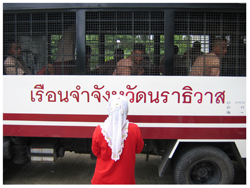A ray of hope for detainees on security charges in the far South?
 By Pratchaya Toe-e-tae
By Pratchaya Toe-e-tae
In the restive deep South, justice under the law, especially justice under Martial Law or under State of Emergency Act, as perceived by state authorities seems to carry a completely different meaning from the version of justice as perceived by many ethnic Malay Muslims.
For the authorities, justice under the law means they are empowered to detain a suspect on security-related charges of up to a maximum of 121 days (seven days under the Martial Law, 30 days under State of Emergency Act and 84 days under the Criminal Procedure Code) before he or she is formally charged in the court.
For the past six years, the courts managed to rule on 216 security-related cases involving 415 defendants. Of these, 211 defendants were convicted in 130 cases while the rest of the defendants were acquitted after 86 cases were thrown out representing 39.8 percent of all the security-related cases.
In last year alone, a total of 190 security-related cases were brought to the court and verdicts were delivered for just 23 cases and three cases were dropped. Out of the 23 cases where judgements were served, only five of them were found to be substantiated and guilty verdicts were delivered.
The fact that many of the cases still pending in the court means that many of the defendants will continue to spend their lives languishing in prison. Also, given the fact that up to 40 percent of the cases were thrown out by the court, it should come as little surprise why the local Muslims in the restive far South have perceived “justice under the law” in a negative light. In their mindset, “justice under the law” is not justice in its true meaning.
The prolonged detention of the suspected militants and their sympathizers under Martial Law, the State of Emergency Act and during court trial has also robbed their families of the breadwinners and resulted to serious hardships to those left behind. A case in point is the case of the Hayeeteh expanded family whose five brothers were detained on security-related charges leaving behind 24 women and children to survive on their own.
To ease the hardships resulted from what was perceived by the locals as “injustice under the law”, the Justice Ministry has come up with the “Remedy for Justice” programme. With an initial funding of just 2.4 million baht approved on February 5, the Justice Ministry used a part of the fund to bail out three men charged with illegal possession of explosives at the request of their family.
Pol Col Thavee Sodsong, deputy permanent secretary of the Justice Ministry said that the three suspects had been detained for nine months and their case did not make headway as the prosecution witnesses had repeatedly failed to show up to testify.
It was reported that bailout granted by the ministry for suspected militants or sympathizers had to meet two preconditions – a guarantee that the suspects will not jump bail and that there is a good chance that the suspects will win the case.
Commenting on the Justice Ministry’s programme to help the detained suspects, Mr Sitthipong Chantharaviroj, secretary-general of Muslim Lawyers Centre, noted that the conditions set might not be practical. He said it is difficult to predict whether a case will be dismissed or convicted. He added that an assurance from a mosque committee that the suspects will not jump bail should be sufficient to be granted with the help from the ministry.
The lawyer went to say that he felt the initial funding provided was too small.
Ms Pornpen Khongkachonkiet, director of access to justice and protection programme of the Cross Cultural Foundation, noted that police and prosecutors should be duty-bound to bring their witnesses to the court to testify as scheduled. If the witnesses did not show up with proper reasons, the court should exercise its power to drop those witnesses.
Nevertheless, she felt the programme initiated by the Justice Ministry to bail out some of the suspects in the deep South amounted to solving the problem at the end cause. To begin with, she said there should not be random or wholesale arrests of suspects without sufficient evidences.
More importantly, the people in the deep South must be made to feel that justice under the law can be trusted.
